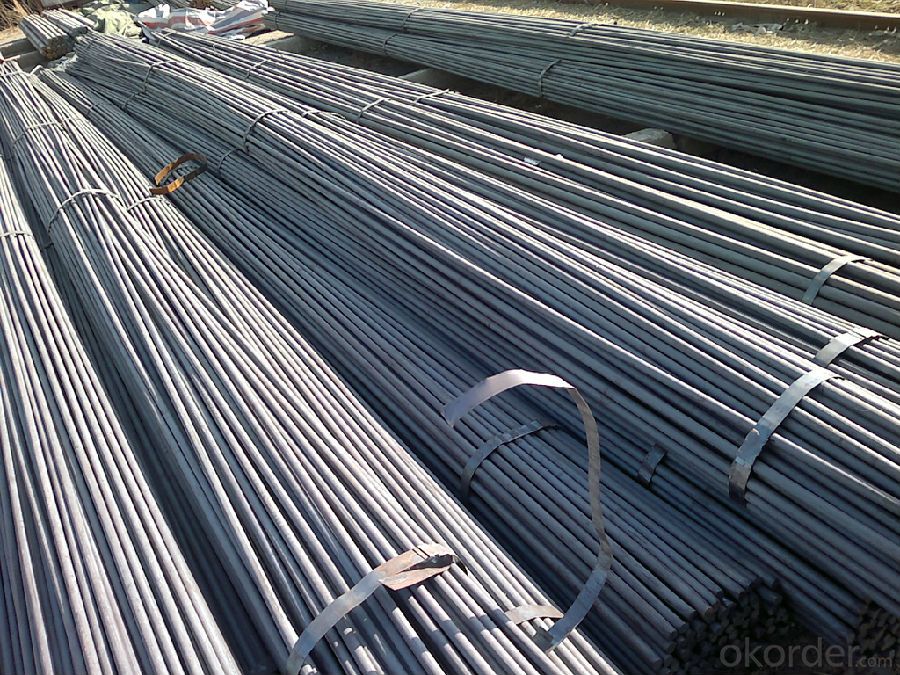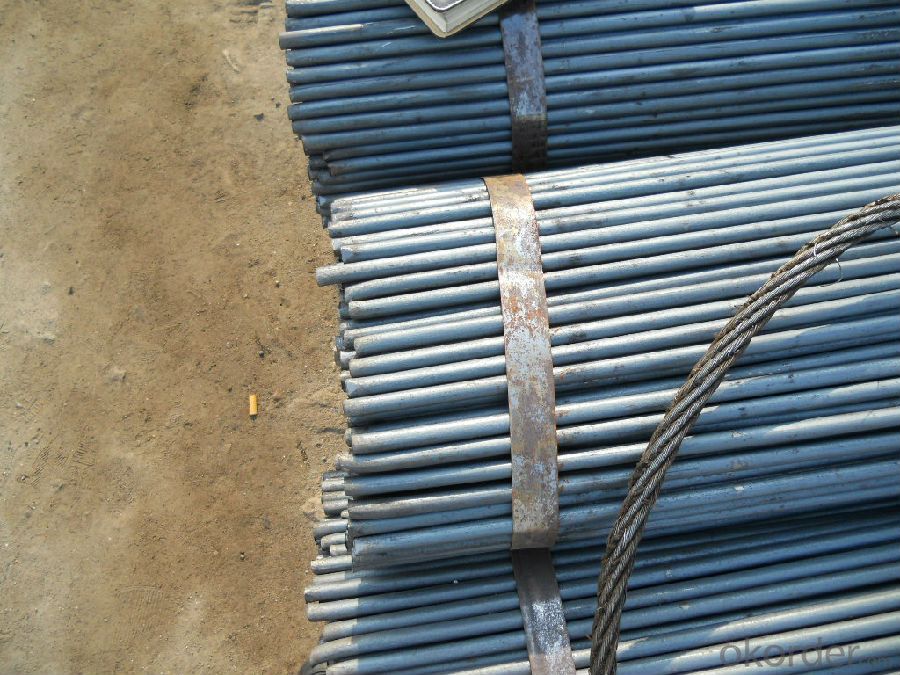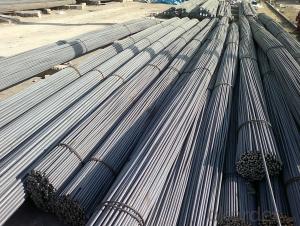Steel Round Bar with Material Q195/Q235 Made in China for Sale
- Loading Port:
- China main port
- Payment Terms:
- TT OR LC
- Min Order Qty:
- 100 m.t.
- Supply Capability:
- 2000 m.t./month
OKorder Service Pledge
OKorder Financial Service
You Might Also Like
Item specifice
Product Description:
OKorder is offering Steel Round Bar with Material Q195/Q235 Made in China for Sale at great prices with worldwide shipping. Our supplier is a world-class manufacturer of steel, with our products utilized the world over. OKorder annually supplies products to European, North American and Asian markets. We provide quotations within 24 hours of receiving an inquiry and guarantee competitive prices.
Product Applications:
Steel Round Bar with Material Q195/Q235 Made in China for Sale are ideal for structural applications and are widely used in the construction of buildings and bridges, and the manufacturing, petrochemical, and transportation industries.
Product Advantages:
OKorder's Steel Round Bar with Material Q195/Q235 Made in China for Sale are durable, strong, and resist corrosion.
Main Product Features:
· Premium quality
· Prompt delivery & seaworthy packing (30 days after receiving deposit)
· Corrosion resistance
· Can be recycled and reused
· Mill test certification
· Professional Service
· Competitive pricing
Packaging Details:
Products are packed in bundle and then shipped by container or bulk vessel, deformed bar is usually naked strapping delivery, when storing, please pay attention to moisture proof. The performance of rust will produce adverse effect.
Each bundle weight: 2-3MT, or as required
Payment term: TT or L/C
Delivery Detail: within 45 days after received advanced payment or LC.
Label: to be specified by customer, generally, each bundle has 1-2 labels
Trade terms: FOB, CFR, CIF
FAQ:
Q1: How do we guarantee the quality of our products?
A1: We have established an advanced quality management system which conducts strict quality tests at every step, from raw materials to the final product. At the same time, we provide extensive follow-up service assurances as required.
Q2: How soon can we receive the product after purchase?
A2: Within three days of placing an order, we will begin production. The specific shipping date is dependent upon international and government factors, but is typically 7 to 10 workday.
Q3: Why buy Materials & Equipment from OKorder.com?
A3: All products offered by OKorder.com are carefully selected from China's most reliable manufacturing enterprises. Through its ISO certifications, OKorder.com adheres to the highest standards and a commitment to supply chain safety and customer satisfaction.
Images:


- Q:What are the maximum allowable stresses for steel round bars?
- The maximum allowable stresses for steel round bars are influenced by various factors, including the grade of steel, the type of loading, and the design code being adhered to. Typically, the maximum allowable stress for steel round bars is determined by considering the yield strength of the steel. The yield strength signifies the stress at which permanent deformation or yielding of the material takes place. Distinct grades of steel possess different yield strengths. For instance, mild steel usually exhibits a yield strength of approximately 250 MPa, while high-strength low-alloy (HSLA) steel can have a yield strength reaching up to 550 MPa. To ascertain the maximum allowable stress, it is customary to apply a safety factor to the yield strength. This safety factor accounts for uncertainties in material properties, loadings, and potential variations in manufacturing processes. The specific safety factor employed can vary based on the application and the design code being followed. For instance, in structural steel design, the American Institute of Steel Construction (AISC) prescribes a safety factor of 1.67 for the yield strength. Thus, the maximum allowable stress would be the yield strength divided by 1.67. In order to determine the appropriate maximum allowable stresses for steel round bars in specific applications, it is crucial to refer to relevant design codes, standards, or engineering specifications.
- Q:What are the different types of steel round bars used in the manufacturing of shafts?
- There are several different types of steel round bars that are commonly used in the manufacturing of shafts. The choice of steel round bar depends on the specific requirements and application of the shaft. Here are some of the most commonly used types: 1. Carbon Steel Round Bars: These are the most common type of steel round bars used in shaft manufacturing. Carbon steel offers good strength and toughness, making it suitable for various shaft applications. 2. Alloy Steel Round Bars: Alloy steel round bars are made by adding other elements such as chromium, nickel, or molybdenum to carbon steel. This enhances the strength, hardness, and wear resistance of the shaft, making it suitable for demanding applications. 3. Stainless Steel Round Bars: Stainless steel is highly corrosion resistant and offers excellent mechanical properties. It is commonly used in shafts that require resistance to corrosion, high temperatures, or harsh environments. 4. Tool Steel Round Bars: Tool steel round bars are known for their exceptional hardness, toughness, and wear resistance. They are used in shafts for cutting tools, molds, and dies that require high performance and durability. 5. High-Speed Steel Round Bars: High-speed steel round bars are primarily used in shafts for cutting tools such as drills, mills, and taps. They have excellent heat resistance and can withstand high cutting speeds without losing their hardness. 6. Mild Steel Round Bars: Mild steel round bars are low carbon steel bars that offer good weldability and machinability. They are commonly used in shafts for less demanding applications that do not require high strength or hardness. It is important to consider the specific requirements, such as strength, hardness, corrosion resistance, and temperature resistance, when selecting the appropriate type of steel round bar for manufacturing shafts.
- Q:Can steel round bars be bent or formed into different shapes?
- Yes, steel round bars can be bent or formed into different shapes through various processes such as hot or cold bending, machining, or using specialized equipment like a pipe bender or a press brake.
- Q:What are the different types of steel round bar alloys for improved toughness?
- Some of the different types of steel round bar alloys that are known for improved toughness include alloy steels such as 4140, 4340, and 8620, as well as tool steels like H13 and D2. These alloys are specifically designed to have enhanced toughness properties, making them suitable for applications where high strength and resistance to wear and impact are required.
- Q:Can steel round bars be threaded or machined?
- Steel round bars are capable of being threaded or machined. Threading involves the creation of internal or external threads on the surface of a steel round bar, enabling it to connect or fasten to other components. Meanwhile, machining entails the utilization of diverse cutting tools and techniques to eliminate material from the steel round bar, thereby shaping it into the desired form or size. Consequently, both threading and machining can be employed on steel round bars to fulfill specific requirements and applications, including the production of threaded rods, bolts, or customized components.
- Q:How do you calculate the torsional strength of a steel round bar?
- To calculate the torsional strength of a steel round bar, you need to consider its material properties, such as the shear modulus and the cross-sectional area of the bar. The torsional strength can be determined using the formula T = (G * J * tau) / L, where T is the torsional strength, G is the shear modulus, J is the polar moment of inertia, tau is the shear stress, and L is the length of the bar.
- Q:What are the different grades of alloy steel round bars for automotive applications?
- Automotive applications commonly utilize alloy steel round bars due to their exceptional strength, durability, and resistance to wear and corrosion. The grading of these bars is typically based on their chemical composition, mechanical properties, and appropriateness for specific automotive uses. Here are several distinct grades of alloy steel round bars frequently employed in automotive applications: 1. 4140/42CrMo4: Renowned for its high tensile strength, good toughness, and excellent fatigue strength, this grade of alloy steel round bars is extensively employed in gears, crankshafts, axles, and suspension components. 2. 8620: Offering exceptional hardenability, this grade of alloy steel round bars can be subjected to heat treatment to attain high strength and toughness. It is commonly utilized in shafts, gears, and camshafts. 3. 4340: Known for its impressive strength and toughness, this grade of alloy steel round bars provides good wear resistance and can be heat treated to achieve even greater hardness and strength. It is often used in connecting rods, crankshafts, and high-stress components. 4. 52100: This high carbon, chromium alloy steel is renowned for its outstanding hardness and wear resistance. It is commonly employed in applications such as bearings and races that require high strength and durability. 5. 316L: Recognized for its exceptional corrosion resistance, particularly in harsh environments, this grade of alloy steel round bars is frequently utilized in automotive applications like exhaust systems, where resistance to corrosion is crucial. 6. 4340M: Specifically designed for high-performance automotive applications, this modified version of the 4340 grade offers improved fatigue strength and toughness. It is suitable for demanding applications, including high-performance engine components. These examples represent only a few of the various grades of alloy steel round bars employed in automotive applications. The selection of a specific grade depends on the requirements of the application, including desired strength, toughness, wear resistance, and corrosion resistance.
- Q:What is the difference between a hot-rolled and a forged steel round bar?
- The main difference between a hot-rolled and a forged steel round bar lies in the manufacturing process and the resulting properties of the finished product. Hot-rolled steel round bars are produced by heating a billet or ingot of steel to a high temperature and then shaping it into the desired form using rollers. This process allows for a high volume of production and a wide range of sizes and shapes. As the steel is heated and shaped, it undergoes significant deformation and recrystallization, resulting in a uniform grain structure. Hot-rolled steel round bars have a rougher surface finish and can have varying levels of internal stress due to the cooling process. They are commonly used in applications where strength and cost-effectiveness are important, such as construction, manufacturing, and general fabrication. On the other hand, forged steel round bars are produced by applying extreme pressure to a heated billet or ingot of steel, typically using a hammer or a press. This process creates a much stronger and more durable product compared to hot-rolled steel. The intense pressure applied during forging aligns the steel's grain structure, resulting in improved mechanical properties such as increased strength, toughness, and resistance to fatigue and impact. Additionally, the forging process eliminates internal voids and porosity, making forged steel round bars more reliable and less prone to failure. Due to the high level of customization and precision involved in forging, these round bars are often used in critical applications that require superior strength and performance, such as aerospace, automotive, and oil and gas industries. In summary, the main differences between hot-rolled and forged steel round bars lie in their manufacturing processes and resulting properties. Hot-rolled steel offers cost-effectiveness and a wide range of sizes and shapes, while forged steel provides superior strength, durability, and reliability. The choice between the two depends on the specific application and the desired performance characteristics.
- Q:Are steel round bars suitable for the production of bearings?
- Steel round bars are unsuitable for bearing production. Bearings necessitate materials with specific properties, including high hardness, wear resistance, and a low friction coefficient. Steel round bars lack these characteristics in their raw form and would require additional processing and treatments to acquire the necessary properties for bearing production. Bearing materials are generally chosen from alloys like stainless steel, chrome steel, or ceramic materials that are designed to withstand challenging conditions and offer optimal performance.
- Q:What are the different shapes available in steel round bars?
- There is a wide range of shapes available for steel round bars, each tailored to meet specific needs and applications. Some commonly used shapes include: 1. Round: This is the most basic and commonly used shape for steel round bars. It has a circular cross-section and finds applications in industries like construction, manufacturing, and engineering. 2. Square: Square steel round bars have a square cross-section, making them ideal for applications that require stability and structural strength. They are often used in constructing frames, supports, and braces. 3. Hexagonal: Hexagonal steel round bars have six flat sides and are utilized in applications that demand better grip and torque resistance, such as machinery and tools. The hexagonal shape ensures a secure connection and prevents slippage. 4. Flat: Flat steel round bars have a rectangular cross-section with two flat sides. They are commonly employed for structural purposes, like building frames, supports, and manufacturing machinery and equipment. 5. Half-round: Half-round steel round bars have a semi-circular cross-section with one flat side. They are frequently used for decorative purposes in architecture, furniture, railings, and handles. 6. Oval: Oval steel round bars have an elongated oval shape, providing a distinctive aesthetic appeal. They are commonly used in decorative applications, like designing furniture, railings, and artistic structures. In summary, the availability of various shapes in steel round bars allows for versatility in different industries. This enables engineers, manufacturers, and designers to select the most suitable shape based on their specific requirements.
1. Manufacturer Overview |
|
|---|---|
| Location | |
| Year Established | |
| Annual Output Value | |
| Main Markets | |
| Company Certifications | |
2. Manufacturer Certificates |
|
|---|---|
| a) Certification Name | |
| Range | |
| Reference | |
| Validity Period | |
3. Manufacturer Capability |
|
|---|---|
| a)Trade Capacity | |
| Nearest Port | |
| Export Percentage | |
| No.of Employees in Trade Department | |
| Language Spoken: | |
| b)Factory Information | |
| Factory Size: | |
| No. of Production Lines | |
| Contract Manufacturing | |
| Product Price Range | |
Send your message to us
Steel Round Bar with Material Q195/Q235 Made in China for Sale
- Loading Port:
- China main port
- Payment Terms:
- TT OR LC
- Min Order Qty:
- 100 m.t.
- Supply Capability:
- 2000 m.t./month
OKorder Service Pledge
OKorder Financial Service
Similar products
New products
Hot products
Hot Searches
Related keywords































